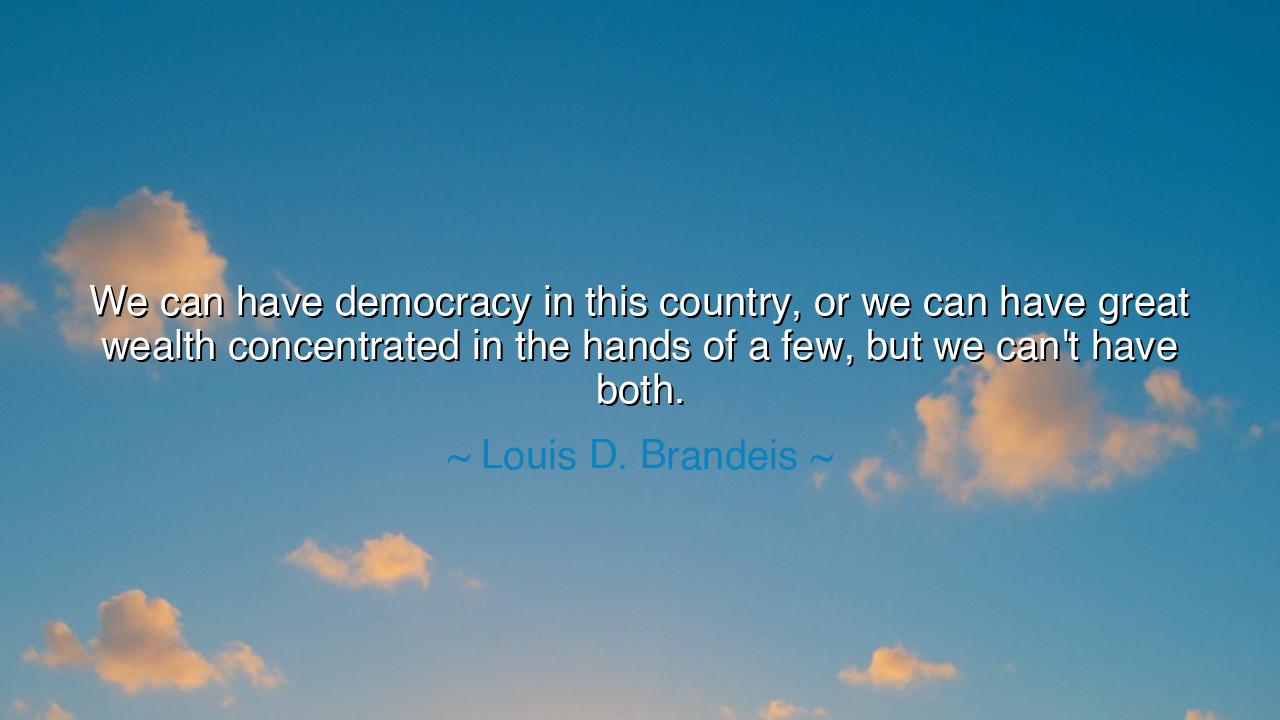
We can have democracy in this country, or we can have great
We can have democracy in this country, or we can have great wealth concentrated in the hands of a few, but we can't have both.






Hearken, children of the ages yet to come, and heed the profound wisdom of Louis D. Brandeis, who declared: “We can have democracy in this country, or we can have great wealth concentrated in the hands of a few, but we can't have both.” In these words lies an eternal truth, echoing from the scrolls of the ancients: that freedom and equality are inseparable from justice, and that the hoarding of riches in the hands of a few imperils the very foundations of liberty.
The ancients knew well that imbalance of wealth breeds tyranny. The philosophers of Athens warned that a republic cannot endure when the many toil in want while a few revel in abundance. Brandeis’ words resonate as a modern echo of that wisdom: concentrated wealth is the enemy of true democracy, for power flows not only from the ballot but also from the purse. When the few amass dominion over resources, they shape law, opinion, and destiny, tilting the scales against the many. The principle is timeless: liberty without equality is an illusion, and democracy without vigilance is vulnerable.
History provides stark testament to this truth. Consider the fall of the Roman Republic, where immense wealth was concentrated in the hands of patricians and magnates, while the plebeians labored in poverty. The imbalance fomented unrest, corruption, and ultimately the rise of emperors whose power eclipsed the voice of the people. Brandeis’ caution mirrors that ancient lesson: the concentration of riches is the slow erosion of liberty, and democracy thrives only when power and opportunity are shared widely.
Brandeis was not a mere prophet of doom but a guide toward balance. His life, devoted to justice as a Supreme Court Justice, embodied the belief that economic equality is not mere charity, but a necessary foundation for civic freedom. In advocating for transparency, fair competition, and restraint upon monopolies, he sought to preserve the fragile harmony between wealth and democracy, teaching that true liberty is inseparable from the equitable distribution of opportunity.
Even in modern times, the principle endures. The industrial age brought immense fortunes to a few, and with it, political influence and social division. Theodore Roosevelt, echoing Brandeis’ concern, championed reforms to curb monopolistic powers, understanding that democracy cannot flourish under the shadow of unchecked wealth. The lesson is clear: vigilance is required to ensure that the engines of prosperity serve all, not merely the privileged.
From these truths, we learn that the stewardship of society requires both wisdom and courage. Citizens must recognize the link between economic balance and political freedom. When wealth is concentrated, the voice of the many is diminished; when opportunity is widespread, democracy is strengthened. The ancients called this justice—a condition where the well-being of all sustains the freedom of all. Brandeis’ words, like the proclamations of philosophers and statesmen, remind us that the health of a nation depends upon fairness as much as upon law.
Practical wisdom flows naturally from this reflection: support systems that ensure opportunity, fairness, and transparency; resist the allure of concentrated power; and engage in civic life not only as voters but as vigilant stewards of justice. Recognize that democracy is a living covenant, sustained by the balance between wealth and the will of the people. The lesson endures across the ages: liberty without vigilance is fragile, and prosperity without equity is perilous.
Children of the ages, let this truth anchor your hearts: a nation may rise or fall upon the axis of equality and freedom. Cherish democracy, guard against the excesses of wealth, and honor the sacred principle that the many must flourish alongside the few. For as Brandeis warns, one cannot have both democracy and concentrated riches; the soul of a free people is nourished only when power and prosperity are shared, not hoarded.
If you wish, I can also craft a more dramatic, narrative version, evoking the tension of ancient republics and modern society, making it feel like an oral teaching that rises and falls like the tides of history. Do you want me to do that?






AAdministratorAdministrator
Welcome, honored guests. Please leave a comment, we will respond soon